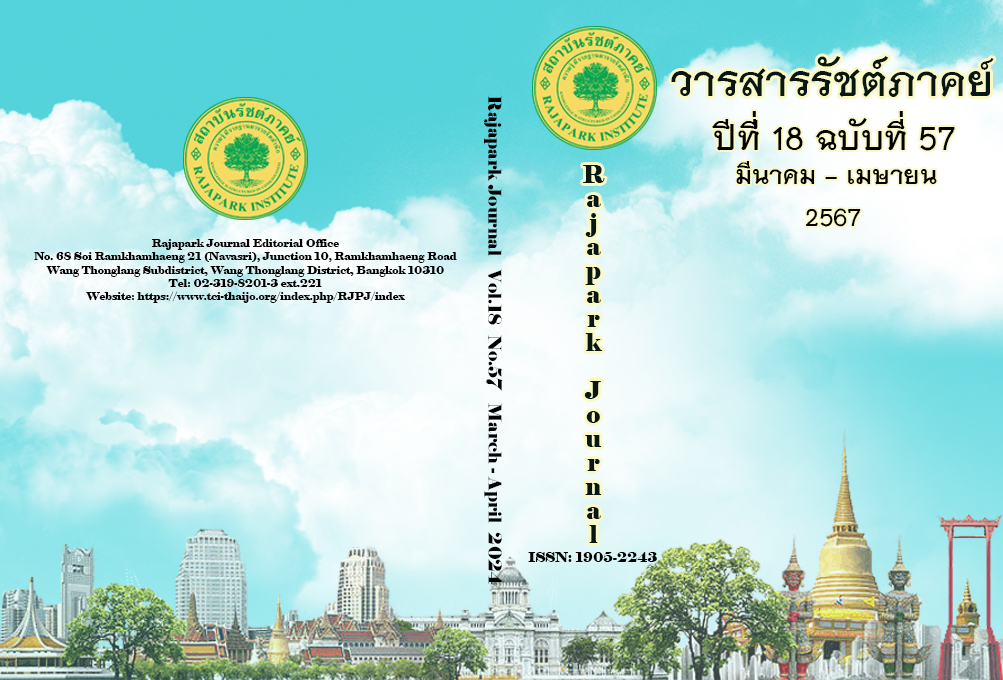โมเดลความสัมพันธ์เชิงสาเหตุการตลาดอิงการกุศล การสร้างคุณค่าทางการตลาดและการตัดสินใจซื้อผลิตภัณฑ์ทำความสะอาดในครัวเรือน
Main Article Content
บทคัดย่อ
การวิจัยครั้งนี้มีวัตถุประสงค์เพื่อ 1) ศึกษาปัจจัยส่วนบุคคลของผู้บริโภคในการตัดสินใจซื้อซื้อผลิตภัณฑ์ทำความสะอาดในครัวเรือน 2) เพื่อศึกษาระดับความคิดเห็นการตลาดอิงการกุศล การสร้างคุณค่าทางการตลาด และการตัดสินใจซื้อ และ 3) เพื่อวิเคราะห์รูปแบบการตลาดอิงการกุศลที่ส่งผลต่อการสร้างคุณค่าทางการตลาดและการตัดสินใจซื้อ เป็นการวิจัยเชิงปริมาณ กลุ่มตัวอย่างจำนวน 600 คน 5 จังหวัด ได้แก่ จังหวัดนครราชสีมา บุรีรัมย์ สุรินทร์ ศรีสะเกษ และอุบลราชธานี จากโปรแกรม AMOSใช้สถิติวิเคราะห์โมเดลสมการโครงสร้าง (SEM-Structural Equation Modeling) ผลการวิจัย พบว่า เพศหญิง มีอายุระหว่าง 18 – 38 ปี การศึกษาระดับปริญญาตรี มีรายได้ส่วนบุคคลต่อเดือน 10,001 – 20,000 บาท อาชีพไม่ได้รับรับราชการ มีประสบการณ์ที่เกี่ยวข้องกับการใช้ผลิตภัณฑ์ทำความสะอาดในครัวเรือน 1 – 3 ปี ความคิดเห็นการตลาดอิงการกุศล พิจารณาประเด็นปัญหาด้านสังคม เน้นคุณภาพของสินค้า และมีความตั้งใจซื้อซื้อโดยตรง อีกทั้งการตลาดอิงการกุศลที่ดีให้กับผู้บริโภคนั้นจะมีความสัมพันธ์กับการสร้างคุณค่าทางการตลาด โดยการตลาดอิงการกุศลนั้นสามารถอธิบายการสร้างคุณค่าทางการตลาดได้ร้อยละ 62.00 และการสร้างคุณค่าทางการตลาดนั้นมีความสัมพันธ์กับการตัดสินใจซื้อและสามารถอธิบายการสร้างคุณค่าทางการตลาดได้ร้อยละ 96.20 สามารถนำไปกำหนดกลยุทธ์การตลาดอิงการกุศลให้เหมาะสมกับผลิตภัณฑ์เพื่อสิ่งแวดล้อม โดยเน้นผลิตภัณฑ์ที่มีคุณภาพเพื่อกระตุ้นพฤติกรรมการตั้งใจซื้อ
Article Details

อนุญาตภายใต้เงื่อนไข Creative Commons Attribution-NonCommercial-NoDerivatives 4.0 International License.
ทัศนะและความคิดเห็นที่ปรากฏในวารสาร ถือเป็นความรับผิดชอบของผู้เขียนบทความนั้น และไม่ถือเป็นทัศนะและความรับผิดชอบของกองบรรณาธิการ
เอกสารอ้างอิง
Arslanagic-Kalajdzic, M., Kadic-Maglajlic, S., Dlacic, J., & Zabkar, V. (2022). We go Together: Understanding Social Cause-Related Purchase Intentions of Young Adults. Journal of Business Research, 140(1), 130-142. https://www.sciencedirect.com/science/
article/pii/S0148296321007992
Arvidsson, S. (2023). CEO Talk of Sustainability in CEO letters: Towards the Inclusion of a Sustainability Embeddedness and Value-Creation Perspective. Sustainability Accounting. Management and Policy Journal, 14(7), 26-61. https://www.emerald.com/insight/content/doi/10.1108/SAMPJ-07-2021-0260/full/html
Badenes‐Rocha, A., Bigne, E., & Ruiz, C. (2022). Impact of cause‐related marketing on consumer advocacy and cause participation: A causal model based on self‐reports and eye‐tracking measures. Psychology & Marketing, 39(1), 214-226. https://doi.org/10.1002/mar.21590
Bhatti, H. Y., Galan-Ladero, M. M., & Galera-Casquet, C. (2023). Cause-Related Marketing: a Systematic Review of the Literature. International Review on Public and Nonprofit Marketing, 20(1), 25-64. https://link.springer.com/article/10.1007/12208-021-00326-y
Chuenyen, B. (2019). A Study of Consumer Perceptions and Factors Affecting Decisions to Buy Consumer Goods Designed for the Environment in the Region in the Lower Northeastern Region (South Isaan). Sri Journal. Wanai Research Ubon Ratchathani Rajabhat University, 10(1), 121-135. https://so13.tci-thaijo.org/index.php/SVNL/issue/view/41
Cong, L., Bremer, P., Fang, E., Li, L., & Mirosa, M. (2022). Biocide Use in the Beverage Industry: Consumers’ Knowledge and Label Preferences Relating to the Ened and Usefulness of Biocides with Particular Reference to Dairy Beverage Products in New Zealand and China. Beverages, 8(1), 552-567. https://www.mdpi.com/2306-5710/8/1/5
Diamantopoulos, A., & Siguaw, J. A. (2000). Introducing LISREL: A Guide for the Uninitiated. Sage.
Fatima, T., & Elbanna, S. (2023). Corporate Social Responsibility (CSR) Implementation: A review and a Research Agenda Towards an Integrative Framework. Journal of Business Ethics, 183(1), 105-121. https://link.springer.com/article/10.1007/s10551-022-05047-8
Hair, J. F., Anderson, R. E., Tatham, R. L., & Black, W. C. (1998). Multivariate Data Analysis (5th ed). Prentice Hall.
Hamilton, D., McKechnie, J., Edgerton, E., & Wilson, C. (2021). Immersive virtual reality as a pedagogical tool in education: a systematic literature review of quantitative learning outcomes and experimental design. Journal of Computers in Education, 8(1), 1-32. https://link.springer.com/article/10.1007/s40692-020-00169-2
Iddrisu, S., Siiba, A., Alhassan, J., & Abass, K. (2023). Land-Use and Land Cover Change Dynamics in Urban Ghana: Implications for Peri-Urban Livelihoods. International Journal of Urban Sustainable Development, 15(1), 80-96. https://www.tandfonline.com/doi/full/
1080/19463138.2023.2184822.
Likert, R. (1932). A Technique for the Measurement of Attitudes. Archives of psychology.
Mariani, M., & Borghi, M. (2023). Exploring Environmental Concerns on Digital Platforms Through Big Data: The Effect of Online Consumers’ Environmental Discourse on Online Review Ratings. Journal of Sustainable Tourism, 31(11), 2592-2611. https://www.tandfonline.com/doi/full/10.1080/09669582.2022.2033982
Ma'sumah, S., Hamidi, L., & Adam, I. T. (2023). Land Profit Sharing For Increasing Productivity. International Journal of Social Science, Education, Communication and Economics (SINOMICS JOURNAL), 2(4), 1003-1012. https://sinomicsjournal.com/
index.php/SJ/article/view/193
Namahoot, K. S., & Laohavichien, T. (2018). Assessing the Intentions to Use Internet Banking: The Role of Perceived Risk and Trust as Mediating Factors. International Journal of Bank Marketing, 36(2), 256-276. DOI: 10.1108/IJBM-11-2016-0159.
Prasittirathasin, S. (2008). Multivariate Analysis Techniques for Research Social Science and Behavioral Sciences. Leaingcheing Publishing.
Rasoolimanesh, S. M., Iranmanesh, M., Seyfi, S., Ari Ragavan, N., & Jaafar, M. (2023). Effects of Perceived Value on Satisfaction and Revisit Intention: Domestic vs. international tourists. Journal of Vacation Marketing, 29(2), 222-241. https://journals.sagepub.com/
doi/abs/10.1177/13567667221086326
Registration Administration Office Department of Provincial Administration. (2023). Government Places and Centers. https://www.nso.go.th/.
Saibuator, S., & Snae Namahoot, K. (2019). Pattern of Behavioral Acceptance of Internationality in The Use of Smart Applications for Health of Gen X. Srinakharinwirot Business Journal, 10(2), 78-91. https://so05.tci-thaijo.org/index.php/RJPJ/article/view/266661
Schumacker, R. E., & Lomax, R. G. (2010). A Beginner’s Guide to Structural Equation Modeling (3rd ed). Lawrence Erlbaum Associates.
Silpcharu, T. (2017). Research and Statistical Analysis with SPSS and AMOS. Business R&D.
Stiglitz, J. E., & Regmi, I. (2023). The Causes of and Responses to Today’s Inflation. Industrial and Corporate Change, 32(2), 336-385. https://academic.oup.com/icc/article-abstract/32/2/336/7071722.
Terblanche, N. S., Boshoff, C., & Human-Van Eck, D. (2023). The Influence of Cause-Related Marketing Campaign Structural Elements on Consumers’ Cognitive and Affective Attitudes and Purchase Intention. International Review on Public and Nonprofit Marketing, 20(1), 193-223. https://link.springer.com/article/10.1007/s12208-022-00338-2
Thomas, S. (2021). Determinants of Cause-Related Marketing Participation Intention: The Role of Consumer Knowledge, Cause Scope and Donation Proximity. Journal of Nonprofit & Public Sector Marketing, 35(2), 194-214. https://www.tandfonline.com/doi/
abs/10.1080/10495142.2021.1970077
Uralovich, K. S., Toshmamatovich, T. U., Kubayevich, K. F., Sapaev, I. B., Saylaubaevna, S. S., Beknazarova, Z. F., & Khurramov, A. (2023). A Primary Factor in Sustainable Development and Environmental Sustainability is Environmental Education. Caspian Journal of Environmental Sciences, 21(4), 965-975. https://cjes.guilan.ac.ir/article_7155.html
Van Tonder, E., Fullerton, S., De Beer, L. T., & Saunders, S. G. (2023). Social and Personal Factors Influencing Green Customer Citizenship Behaviours: The Role of Subjective Norm, Internal Values and Attitudes. Journal of Retailing and Consumer Services, 71(1), 103190. https://www.sciencedirect.com/science/article/abs/pii/S0969698922002831
Wang, L., Zhang, Q., Ding, Y. Y., & Wong, P. P. W. (2023). The Effect of Social and Personal Norm on Intention to Patronize Green Hotels: Extension of Theory of Planned Behavior. Journal of China Tourism Research, 19(2), 311-334. https://www.tandfonline.com/doi/
abs/10.1080/19388160.2022.2070567
Wu, S. (2021). The Health Impact of Household Cooking Fuel Choice on Women: Evidence from China. Sustainability, 13(21), 12080. https://www.mdpi.com/2071-1050/13/21/12080
Yamakanith, P., Suksawa, S., & Sanont, R. (2022). The relationship between the marketing mix and the purchasing decision process for environmentally friendly product of consumers in pathum thani provice. Journal of Suvarnabhumi Institute of Technology (Humanities and Social Sciences), 8(2), 34-49. https://so04.tci-thaijo.org/index.php/svittj/article/view/257708


